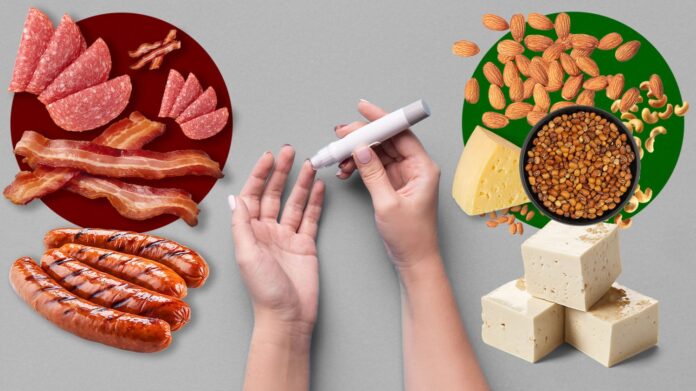Researchers at Harvard University T.H. Chan School of Public Health in the United States have asserted that just two servings of red meat per week may increase the risk of developing type 2 diabetes, when compared to people who eat fewer servings, and that the risk increases with greater consumption.
The new study, published on 19 October also found that replacing red meat with healthy plant-based protein sources, such as nuts and legumes, or modest amounts of dairy foods, was associated with reduced risk of type 2 diabetes. Red meat consumption included both processed and unprocessed red meat.
Previous studies have found evidence linking red meat consumption to risk of developing type 2 diabetes. However, the new study, which analyzed a larger number of type 2 diabetic patients, and monitored them for an extended period of years, provides a greater degree of certainty to the link between red meat consumption and type 2 diabetes risk.
Type 2 diabetes rates are increasing rapidly around the world. According to the World Health Organization (WHO) worldwide about 422 million people have diabetes, and over 1.5 million deaths each year are directly attributed to diabetes. These numbers have been steadily increasing over the past decades, and while earlier diabetes was largely associated with rich developed nations, today, most of the people living with diabetes are in low- and middle-income states.
The increase in number is of concern to health authorities, as diabetes is a chronic, metabolic disease that elevates levels of blood glucose and impairs body functions. But even more concerning is the fact that diabetes is also a major risk factor for cardiovascular and kidney disease, cancer, and dementia due to the serious damage it causes to the heart, blood vessels, eyes, kidneys and nerves.
For this study, the researchers analyzed health data from 216,695 participants from studies conducted by the US National Health Services and follow-up studies that assessed food frequency through questionnaires sent to participants every two to four years over a period of 36 years. During the study period, over 22,000 participants were found to have developed type 2 diabetes.
The researchers found that consumption of red meat, including processed and unprocessed red meat, was strongly associated with increased risk of type 2 diabetes. Participants who ate the most red meat had a 62 percent higher risk of developing type 2 diabetes compared to those who ate the least. Every additional daily serving of processed red meat was associated with a 46 percent greater risk of developing type 2 diabetes and every additional daily serving of unprocessed red meat was associated with a 24 percent greater risk.
The researchers also estimated the potential effects of substituting one daily serving of red meat for another protein source. They found that substituting a serving of nuts and legumes was associated with a 30 percent lower risk of type 2 diabetes, and substituting a serving of dairy products was associated with a 22 percent lower risk.
Based on findings from the new study, health authorities, doctors and dietitians are even more confident in recommending that in order to optimize health and wellbeing people should limit the consumption of red meat to about one serving per week, and aim to swap red meat for healthier plant-based proteins — an option that is not only healthier for people but also beneficial for the environment, as it could help reduce greenhouse gas emissions linked to climate change.

















